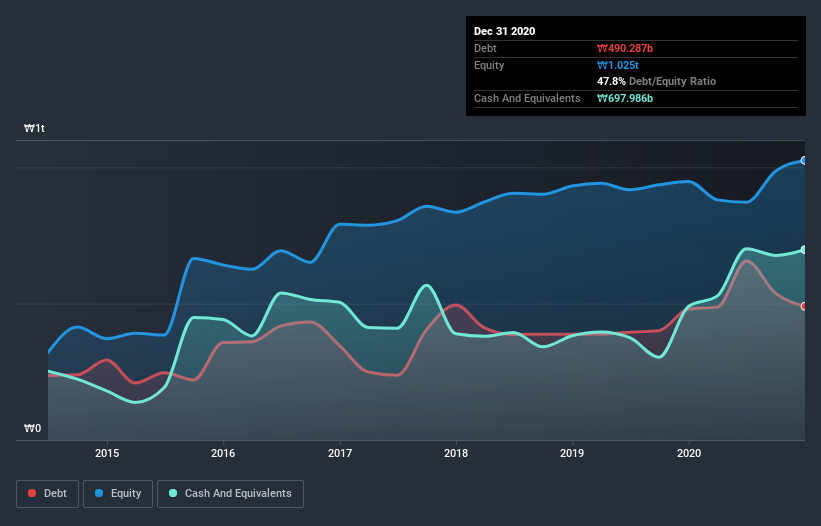
Some say volatility, rather than debt, is the best way to think about risk as an investor, but Warren Buffett famously said that 'Volatility is far from synonymous with risk.' It's only natural to consider a company's balance sheet when you examine how risky it is, since debt is often involved when a business collapses. Importantly, Hyundai Elevator Co., Ltd (KRX:017800) does carry debt. But is this debt a concern to shareholders?
When Is Debt A Problem?
Debt is a tool to help businesses grow, but if a business is incapable of paying off its lenders, then it exists at their mercy. Ultimately, if the company can't fulfill its legal obligations to repay debt, shareholders could walk away with nothing. However, a more usual (but still expensive) situation is where a company must dilute shareholders at a cheap share price simply to get debt under control. Of course, the upside of debt is that it often represents cheap capital, especially when it replaces dilution in a company with the ability to reinvest at high rates of return. The first step when considering a company's debt levels is to consider its cash and debt together.
View our latest analysis for Hyundai Elevator
What Is Hyundai Elevator's Debt?
As you can see below, Hyundai Elevator had ₩490.3b of debt, at December 2020, which is about the same as the year before. You can click the chart for greater detail. But it also has ₩698.0b in cash to offset that, meaning it has ₩207.7b net cash.

A Look At Hyundai Elevator's Liabilities
Zooming in on the latest balance sheet data, we can see that Hyundai Elevator had liabilities of ₩929.8b due within 12 months and liabilities of ₩671.0b due beyond that. On the other hand, it had cash of ₩698.0b and ₩254.9b worth of receivables due within a year. So its liabilities outweigh the sum of its cash and (near-term) receivables by ₩648.0b.
Hyundai Elevator has a market capitalization of ₩1.83t, so it could very likely raise cash to ameliorate its balance sheet, if the need arose. But we definitely want to keep our eyes open to indications that its debt is bringing too much risk. Despite its noteworthy liabilities, Hyundai Elevator boasts net cash, so it's fair to say it does not have a heavy debt load!
And we also note warmly that Hyundai Elevator grew its EBIT by 10% last year, making its debt load easier to handle. When analysing debt levels, the balance sheet is the obvious place to start. But ultimately the future profitability of the business will decide if Hyundai Elevator can strengthen its balance sheet over time. So if you want to see what the professionals think, you might find this free report on analyst profit forecasts to be interesting.
But our final consideration is also important, because a company cannot pay debt with paper profits; it needs cold hard cash. Hyundai Elevator may have net cash on the balance sheet, but it is still interesting to look at how well the business converts its earnings before interest and tax (EBIT) to free cash flow, because that will influence both its need for, and its capacity to manage debt. In the last three years, Hyundai Elevator's free cash flow amounted to 49% of its EBIT, less than we'd expect. That weak cash conversion makes it more difficult to handle indebtedness.
Summing up
Although Hyundai Elevator's balance sheet isn't particularly strong, due to the total liabilities, it is clearly positive to see that it has net cash of ₩207.7b. And it also grew its EBIT by 10% over the last year. So we don't have any problem with Hyundai Elevator's use of debt. The balance sheet is clearly the area to focus on when you are analysing debt. However, not all investment risk resides within the balance sheet - far from it. For example - Hyundai Elevator has 2 warning signs we think you should be aware of.
When all is said and done, sometimes its easier to focus on companies that don't even need debt. Readers can access a list of growth stocks with zero net debt 100% free, right now.
If you’re looking to trade Hyundai Elevator, open an account with the lowest-cost* platform trusted by professionals, Interactive Brokers. Their clients from over 200 countries and territories trade stocks, options, futures, forex, bonds and funds worldwide from a single integrated account. Promoted
Valuation is complex, but we're here to simplify it.
Discover if Hyundai Elevator might be undervalued or overvalued with our detailed analysis, featuring fair value estimates, potential risks, dividends, insider trades, and its financial condition.
Access Free AnalysisThis article by Simply Wall St is general in nature. It does not constitute a recommendation to buy or sell any stock, and does not take account of your objectives, or your financial situation. We aim to bring you long-term focused analysis driven by fundamental data. Note that our analysis may not factor in the latest price-sensitive company announcements or qualitative material. Simply Wall St has no position in any stocks mentioned.
*Interactive Brokers Rated Lowest Cost Broker by StockBrokers.com Annual Online Review 2020
Have feedback on this article? Concerned about the content? Get in touch with us directly. Alternatively, email editorial-team (at) simplywallst.com.
About KOSE:A017800
Hyundai Elevator
Designs, manufactures, installs, maintains, and modernizes elevators in South Korea and internationally.
Adequate balance sheet and slightly overvalued.

